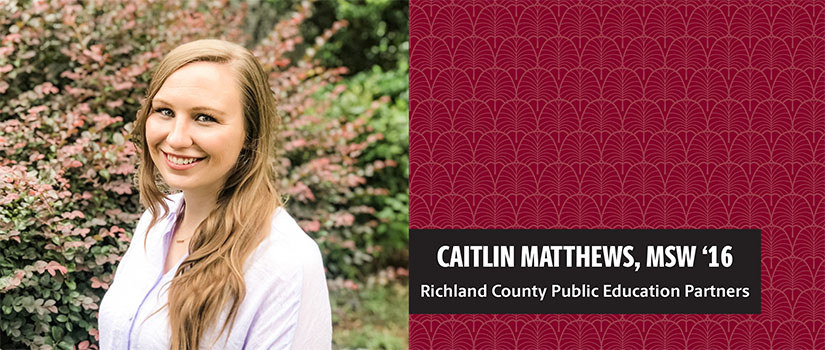Aug. 26, 2020
Chris Woodley • cwoodley@mailbox.sc.edu
Caitlin Matthews, MSW ‘16 always envisioned herself as an English teacher. Not only was her mom a teacher, but her high school English teacher was one of the most influential people in her life. While Matthews graduated with a degree in English from Presbyterian College, she realized her true passion was not teaching literature or curriculum.
“Teachers are amazing, but I wanted to be a school social worker to make sure families had the tools and resources necessary to be successful,” Matthews says.
Four months after graduating with her Master of Social Work, Matthews began working for Achieve Columbia as a student services coordinator at a local middle school in Richland School District One. Last year, Achieve Columbia was renamed Richland County Public Education Partners, and Matthews job moved to Jackson Creek Elementary. Along with serving families, she works with a behavior intervention specialist, the United Way, and alumna Abby Cobb, MSW ’03, the lead social worker for the school district.
“Abby has ensured our program was in her district. I am incredibly proud of my work, and it’s only possible through her support and supervision,” Matthews says.
Matthews currently works with families as part of the Resilient Richland program, which is a coalition of public and private agencies that individually recognize the impact of trauma on children and families. She begins working with families and their children in kindergarten and remains with them until third grade.
“My work can look different for each family, but my job is to make sure they continue to be resilient and have everything they need,” Matthews says. “This may be food, clothes, or making sure events that happen in their lives are not disastrous. For example, if a family suffers a house fire, I’ll provide resources to help them find housing and make sure their kids stay in school. It's my job to help families stay the course and make sure that events that happen to don’t derail them.”
Matthews jobs allows her the opportunity to work with families and their children for four years. While a teacher greets a new class of students each year, Matthews does not have to say goodbye at the end of each school year.
“It’s nice to be able to say, ‘See you next year,’” Matthews says. “Since I work with these families over the long-term, I will hopefully see the seeds planted in kindergarten sprout and grow by the time they reach third grade and lead to long-term success.”
Matthews has also worked to build a community among the parents of students. She accomplished this last fall by inviting parents to a dinner, where she discussed events at the school and how trauma can affect families and their children. Since each family has experienced trauma on some level, this was one of the opportunities to give them the tools they need to remain resilient.
“I tell our parents that because they have already been through hard times, they are actually more likely to be successful than people who have not,” Matthews says. “Resiliency has a way of making people more successful. Part of my job is reminding parents that they are strong by showing them the tools they already have, giving them additional tools, and making sure they are using them in a productive way.”
Matthews had to be resilient herself when only seven parents attended her first dinner. In addition, no one in attendance knew any other parents of kindergarten students. But this only inspired her to build a stronger connection between parents and herself.
“We had a family game night, and it was fun seeing kids introducing parents to their friends and parents interacting with one another,” Matthews says. “Watching those connections made me realize that many parents are living on islands and don't have support from others. It takes a village to succeed, and I was helping build the village.”
Matthews support network continued to grow, even though in-person classes and interactions ended in March due to COVID-19. But she adjusted her responsibilities to help parents in new environments.
“We started weekly parent Zoom calls to help and support them with homeschooling,” Matthews says. “It transformed into more of a semi-support group that I led until the end of the school year. COVID removed that bridge connecting me with parents. Not seeing the kids and not knowing how they were doing was tough and getting kids back into the classroom routine this year could be a big hurdle.”
Matthews has also dealt with the negative stigma towards school social workers that may still exist when she initially meets parents. While most are not surprised to see a school social worker, they do not expect someone in kindergarten who is dedicated to parents.
“It was hard to get parents on board the first few weeks last year because some thought they were in trouble when I called,” Matthews says. “Bridging the gap between my intentions and parents believing that I was critiquing them took a lot of relationship building.
One parent approached me after a presentation last year and asked if I was from the Department of Social Services. Working past those negative stereotypes took some time. Even though there will be some new students this year, I don't have to repeat the process of ensuring people that I'm here to help them.
Matthews not only enjoys her job but also lives out the social work values daily through her work.
“I read that ‘social workers are not superheroes.’ I'm not fixing families or waving a magic wand but just making sure they know their strengths and that there are resources for them,” Matthews says. “It's a matter of making families aware of how much they have endured, how strong they are, and making sure that I’m not a quick fix but helping build long-term success.”
